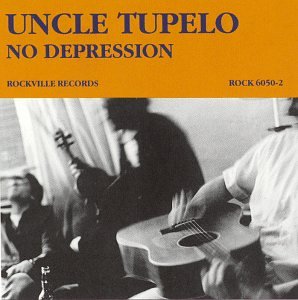
No Depression (album)
No Depression is the first studio album by alternative country band Uncle Tupelo, released in June 1990. After its formation in the late 1980s, Uncle Tupelo recorded the Not Forever, Just for Now demo tape, which received a positive review by the College Media Journal in 1989.[1] The review led to the band's signing with what would become Rockville Records later that year. The album was recorded with producers Sean Slade and Paul Q. Kolderie at Fort Apache Studios, on a budget of US$3,500.
No Depression
June 21, 1990
January 21–31, 1990
Fort Apache South, Boston, MA
41:41
No Depression was critically acclaimed and sold well for an independent release. Selling over 15,000 copies within a year of its release, the album's success inspired the roots music magazine No Depression. The record is considered one of the most important alternative country albums, and its title is often used as a synonym for the alternative country genre after being popularized by No Depression magazine. After regaining the rights to the album through a lawsuit, Uncle Tupelo released a remastered version in 2003 through Legacy Records, expanded to include six bonus tracks.
Background[edit]
Jay Farrar, Jeff Tweedy and Mike Heidorn began their musical careers in the 1980s playing in a garage band, The Plebes.[2] After a few gigs, creative differences between the members led to the development of a punk rock sound for the band.[3] As punk rock was unpopular in the St. Louis region, the band changed their style to blues-rock and renamed themselves Uncle Tupelo. At this point, they stopped performing covers and began to write their own songs.[4]
The band discovered a musical niche around Washington University in St. Louis, where bands such as Brian Henneman's Chicken Truck performed in a similar style.[5] The trio recorded its first professional tracks in Champaign, Illinois with future Chicago punk producer Matt Allison. The demo tape, Not Forever, Just for Now, contained early versions of several songs that would later appear on their debut album, including "Train", "Whiskey Bottle", "Flatness", "Screen Door", and "Before I Break".[6]
That demo, as well as the band's rigorous touring schedule, attracted the attention of several music scouts. Record labels initially were wary of signing the band whom they perceived as straddling "the divide between the countrified punk of early 1980s such as Green on Red, Jason & the Scorchers, and X—none of whom had bum-rushed the charts—and the Pacific Northwest grunge of Mudhoney and Nirvana, which was still years from breaking out commercially".[6] However, the influential CMJ New Music Report gave the demo tape a favorable review in 1989, praising its "mature, developed, seriously thought-out songwriting". This review prompted New York City-based distributor Dutch East India Trading to provide funding for the band to record an album on their Giant Records label, shortly before the label was renamed to Rockville Records.[3][7]
Recording[edit]
Six months before signing a full contract with Giant/Rockville, Uncle Tupelo recorded the tracks for No Depression over ten days in January 1990 at Fort Apache South, a musician-run studio in the Roxbury neighborhood of Boston, Massachusetts.[3][8] As the trio could not afford the cost of recording at a twenty-four track studio in nearby Cambridge, they settled on the cheaper Fort Apache studio. The album cost US$3,500 to produce, $1,000 of which went to in-house producers Sean Slade and Paul Q. Kolderie. The band was interested in working with Slade and Kolderie after hearing their production of Dinosaur Jr.'s album Bug.[9] The producers allowed Farrar to use the same 1961 Gibson Les Paul guitar that J. Mascis used on Bug, which gave the power chords on No Depression a richer tone.[10]
Slade and Kolderie suggested that the band deemphasize the roots rock influences heard on Not Forever, Just for Now and convinced them to replace the harmonica parts with pedal steel guitar. For this, Slade and Kolderie recruited guitarist Rich Gilbert of Human Sexual Response for the recording.[10] The tracks were recorded using little overdubbing; only a few banjo and acoustic guitar parts were later added to the songs. At the suggestion of Slade and Kolderie, No Depression was recorded on eight-track, so "the music would compress and "jump" off the tape during playback".[3] The recording sessions occurred before Uncle Tupelo officially became affiliated with Giant Records, so there was little input from the label.[3]
Lyrically the songs reflected the band members' experiences growing up in Belleville. Farrar and Tweedy romanticized tales about unemployment, alcoholism, and the feeling of living in a small town in an effort to emulate the profundity of songwriters such as Woody Guthrie.[11] Musically, No Depression was influenced by the start-stop musical pattern of the Minutemen.[12] The cover of the album features a blurry photo of the band, taken by J. Hamilton, reminiscent of the albums released on Folkways Records.[13]